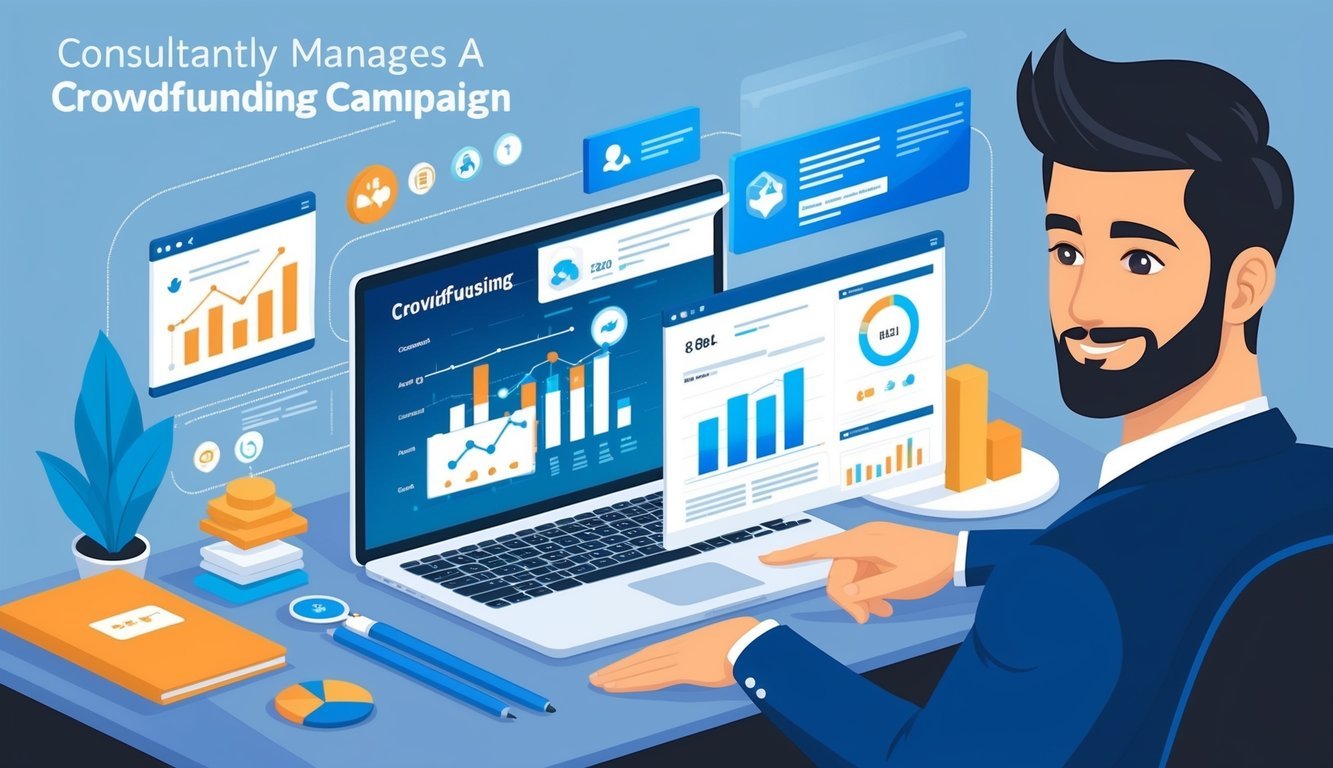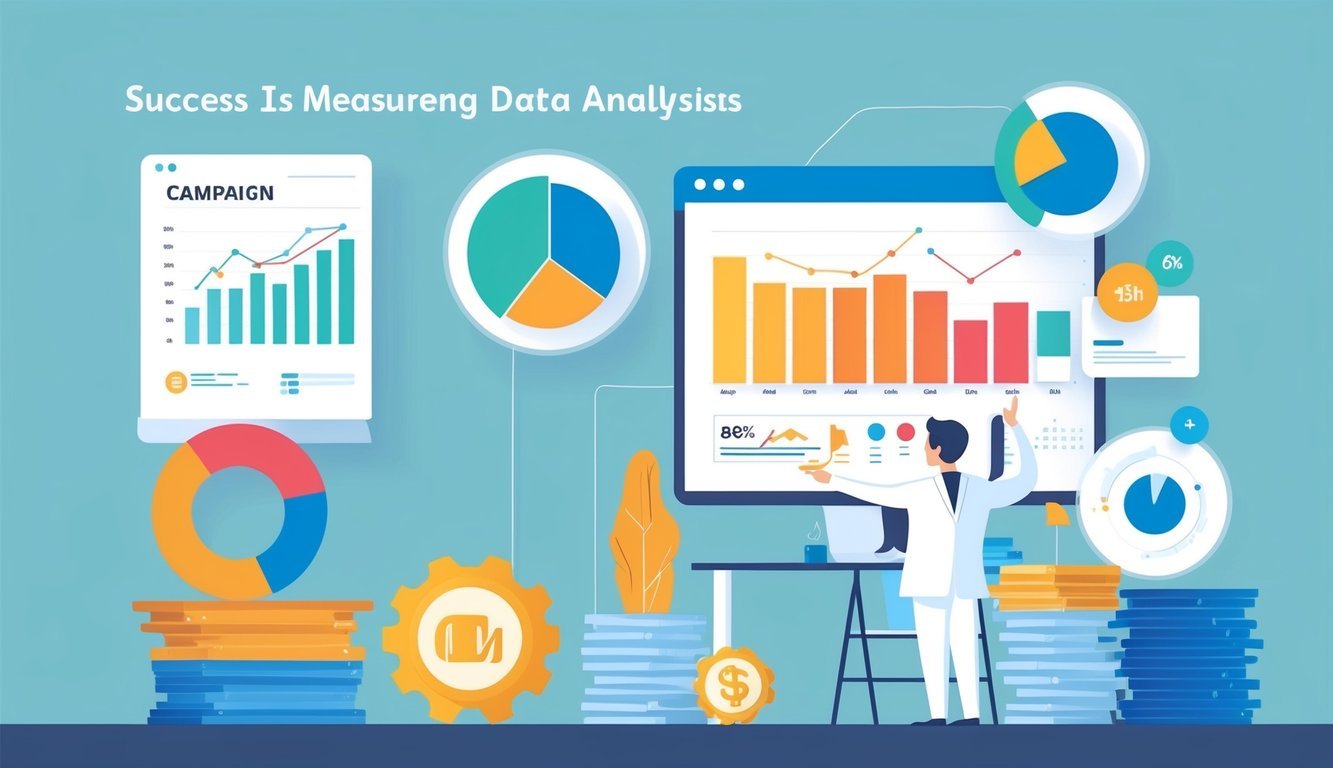Starting a crowdfunding consultant side hustle can be an exciting and lucrative venture for those with expertise in online fundraising.
Crowdfunding continues to grow in popularity, and businesses and individuals are seeking guidance to make their campaigns stand out. You can leverage your knowledge and experience to help clients achieve their fundraising goals while building a flexible, rewarding business.
By becoming a crowdfunding consultant, you’ll have the opportunity to work with diverse projects and clients.
From assisting nonprofits in raising funds for important causes to helping entrepreneurs launch innovative products, your skills can make a significant impact.
This side hustle allows you to set your own hours, choose your clients, and potentially earn substantial income while doing work you’re passionate about.
To get started, focus on developing your expertise in various crowdfunding platforms, campaign strategies, and marketing techniques.
Build a portfolio of successful campaigns and consider specializing in specific niches to differentiate yourself.
As you gain experience and positive client testimonials, you can gradually expand your services and potentially turn your side hustle into a full-time business.
Key Takeaways
- Crowdfunding consulting offers a flexible and potentially lucrative side hustle opportunity
- Develop expertise in various platforms and campaign strategies to attract clients
- Build a strong portfolio and consider specializing to stand out in the market
The Role of a Crowdfunding Consultant
Crowdfunding consultants play a crucial part in guiding campaigns to success.
They bring expertise, strategy, and insider knowledge to help you navigate the complexities of raising funds online.
What Is Crowdfunding Consulting?
Crowdfunding consulting involves providing expert advice and support to individuals or organizations launching crowdfunding campaigns.
As a consultant, you’d help clients plan, execute, and manage their campaigns effectively.
Your role would include analyzing market trends, setting realistic funding goals, and developing compelling campaign narratives.
You’d also assist in creating eye-catching campaign pages and promotional materials.
A key part of your job would be to devise marketing strategies to attract backers and maintain momentum throughout the campaign.
Required Skills and Expertise
To succeed as a crowdfunding consultant, you need a diverse skill set.
Strong communication skills are essential, as you’ll be working closely with clients to understand their vision and translate it into a successful campaign.
Marketing expertise is crucial.
You should be adept at:
- Social media management
- Email marketing
- Content creation
- Public relations
A deep understanding of various crowdfunding platforms and their specific requirements is vital.
You should also be familiar with campaign analytics and data interpretation to make informed decisions.
Financial acumen is important too.
You’ll need to help clients set realistic funding goals and create budgets for their projects.
The Value of Strategic Advice
Your strategic advice can make the difference between a campaign’s success or failure.
With 65% of crowdfunding campaigns failing to reach their goals, your expertise becomes invaluable.
You’ll guide clients in choosing the right platform, timing their launch, and structuring rewards or perks for backers.
Your insights on campaign duration, funding targets, and promotional tactics can significantly boost success rates.
By leveraging your network and industry connections, you can help clients gain visibility and credibility.
Your ability to anticipate and overcome common pitfalls can save clients time, money, and stress.
Setting Up Your Crowdfunding Consultancy Side Hustle

Starting a crowdfunding consultancy side hustle requires careful planning and strategic setup.
You’ll need to establish your unique brand, navigate legal requirements, and build a strong online presence to attract clients.
Establishing Your Brand and Offering
Your brand is crucial in setting you apart from other consultants.
Define your niche within crowdfunding – perhaps you specialize in tech startups or nonprofit campaigns.
Craft a unique value proposition that highlights your expertise and the specific results you can deliver.
Create a catchy business name that reflects your specialty.
For example, “LaunchPad Funding Solutions” or “CrowdBoost Consultancy.”
Develop a range of services tailored to your target audience:
- Campaign strategy development
- Pitch deck creation
- Backer engagement plans
- Marketing and PR support
Consider offering tiered pricing options to cater to different client budgets.
You might have a basic package for campaign review and a premium option for full-service management.
Legal Considerations and Finance Management
Protect yourself and your side hustle by addressing legal and financial aspects.
Register your business as an LLC or sole proprietorship, depending on your needs and local regulations.
Open a separate business bank account to keep your personal and business finances distinct.
This will simplify tax reporting and give you a clearer picture of your side hustle’s performance.
Consider these financial aspects:
- Set up a bookkeeping system (e.g., QuickBooks, Wave)
- Determine your pricing structure and payment terms
- Create a simple contract template for client engagements
Don’t forget to set aside money for taxes.
As a consultant, you’ll likely need to pay quarterly estimated taxes.
Building Your Online Presence
In today’s digital world, a strong online presence is essential for attracting clients.
Start by creating a professional website that showcases your expertise and services.
Include case studies of successful campaigns you’ve worked on, if possible.
Leverage social media platforms to establish yourself as an authority in crowdfunding.
Share insights, tips, and industry news regularly.
LinkedIn can be particularly valuable for connecting with potential clients and other professionals in the field.
Create content that demonstrates your knowledge:
- Write blog posts about crowdfunding trends
- Produce short videos with campaign tips
- Host webinars on successful crowdfunding strategies
Consider guest posting on relevant industry blogs or being interviewed on podcasts to expand your reach and build credibility in the crowdfunding space.
Understanding Different Crowdfunding Platforms

Choosing the right crowdfunding platform is crucial for your clients’ success.
Each platform has unique features, audience demographics, and funding models that can significantly impact campaign outcomes.
Comparing Kickstarter and Indiegogo
Kickstarter and Indiegogo are two of the most popular reward-based crowdfunding platforms.
Kickstarter follows an all-or-nothing model, where projects must reach their funding goal to receive any money.
This creates urgency but can be riskier.
Indiegogo offers more flexibility with both fixed and flexible funding options.
With flexible funding, you keep what you raise even if you don’t hit your goal.
Kickstarter tends to have a larger user base and is great for creative projects.
Indiegogo is often preferred for tech and innovation campaigns.
Consider your client’s project type, funding needs, and risk tolerance when choosing between these platforms.
Equity-Based Crowdfunding Explained
Equity-based crowdfunding allows backers to become shareholders in a company.
Instead of rewards, they receive equity or a stake in the business.
This model is ideal for startups looking to raise significant capital while building a community of invested supporters.
Platforms like StartEngine and SeedInvest specialize in equity crowdfunding.
These platforms typically have stricter requirements and regulations compared to reward-based crowdfunding.
Your clients must be prepared to share financial information and comply with securities laws.
Equity crowdfunding can be a powerful tool for long-term growth but requires careful planning and legal considerations.
Selecting the Right Platform for Your Client
To choose the best platform for your client, consider their project type, funding goals, and target audience. Research different platforms to understand their user demographics and success rates for similar projects.
Evaluate platform fees, payment processing costs, and support services.
Some platforms offer marketing assistance or campaign management tools that can be valuable for your clients.
Consider the platform’s reputation and traffic.
A well-known site might provide more visibility, but niche platforms could connect you with a more targeted audience.
Always review the platform’s terms of service and ensure your client can meet all requirements before launching their campaign.
Planning Effective Crowdfunding Campaigns
Successful crowdfunding campaigns require careful planning and strategy.
You’ll need to set achievable goals, develop a comprehensive plan, and generate excitement before launch to maximize your chances of success.
Setting Realistic Funding Goals
When planning your crowdfunding campaign, it’s crucial to set a funding goal that’s ambitious yet attainable.
Analyze your project’s costs, including production, fulfillment, and fees.
Research similar successful campaigns to gauge realistic targets.
Consider offering pre-orders as part of your campaign.
This can help you gauge interest and secure early supporters.
Remember, some platforms use an all-or-nothing model.
If you don’t reach your goal, you won’t receive any funds.
Others allow you to keep what you raise, regardless of hitting the target.
Be prepared to adjust your goal if needed.
Having a flexible approach can increase your chances of success.
The Importance of Thorough Campaign Planning
A well-planned campaign is key to crowdfunding success.
Start by creating a detailed timeline, outlining each step from pre-launch to fulfillment.
Develop a compelling story for your project.
Explain why it matters and how backers will benefit. Create engaging content, including high-quality images and videos.
Plan your rewards carefully.
Offer a range of options at different price points to appeal to various backers.
Ensure you can deliver on your promises.
Build a team to help manage different aspects of the campaign.
You might need assistance with marketing, content creation, or backer communication.
Creating Pre-Launch Buzz
Generating excitement before your campaign launches can significantly boost your chances of success.
Start building your audience well in advance.
Leverage social media to share updates and teasers about your project.
Create a landing page where interested supporters can sign up for notifications.
Reach out to relevant influencers or media outlets.
Their coverage can help spread the word about your campaign.
Consider hosting a pre-launch event or webinar to showcase your project.
This can help you gather feedback and build a community of early supporters.
Encourage your network to share your campaign.
Word-of-mouth can be a powerful tool in creating buzz and attracting backers.
Marketing and Publicity for Crowdfunding Success
Effective marketing and publicity are crucial for crowdfunding success.
You’ll need to leverage various channels and tactics to reach potential backers and generate buzz for your campaign.
Leveraging Social Media for Outreach
Social media platforms are powerful tools for spreading the word about your crowdfunding campaign.
Start by identifying which platforms your target audience frequents most.
Create engaging content that showcases your project’s unique value proposition.
Use eye-catching visuals, short videos, and compelling captions to grab attention.
Encourage your followers to share your posts to expand your reach. Engage with your audience by responding to comments and messages promptly.
Consider partnering with influencers or micro-influencers in your niche.
Their endorsement can lend credibility to your campaign and expose you to a broader audience.
Remember to use relevant hashtags to increase discoverability.
Create a unique hashtag for your campaign to track conversations and build community around your project.
Developing Press Releases and Media Kits
A well-crafted press release can help you attract media coverage for your crowdfunding campaign.
Start by identifying newsworthy angles related to your project.
Focus on what makes your campaign unique or innovative.
Your press release should include:
- A catchy headline
- Key details about your campaign
- Quotes from team members or industry experts
- High-quality images or video links
Create a comprehensive media kit to provide journalists with all the information they need.
Include your press release, project background, team bios, and high-resolution images or videos.
Reach out to relevant journalists and bloggers in your industry.
Personalize your pitches and explain why your story would interest their audience.
Running Effective Facebook Ad Campaigns
Facebook ads can be a powerful tool for reaching potential backers.
Start by defining your target audience based on demographics, interests, and behaviors relevant to your project.
Create ad visuals that stand out in users’ feeds.
Use clear, compelling copy that highlights the unique benefits of backing your campaign.
Include a strong call-to-action that directs users to your crowdfunding page.
Test different ad formats, such as carousel ads or video ads, to see what resonates best with your audience.
Use Facebook’s targeting options to reach lookalike audiences similar to your existing supporters.
Monitor your ad performance closely and adjust your strategy as needed.
Focus on metrics like click-through rate and conversion rate to optimize your campaigns.
Consider retargeting ads to people who have shown interest but haven’t backed your project yet.
Networking and Community Building

Building strong connections is crucial for success as a crowdfunding consultant.
Effective networking can lead to valuable partnerships, insights, and opportunities to grow your side hustle.
Establishing Connections within the Startup Community
To thrive as a crowdfunding consultant, you need to immerse yourself in the startup ecosystem.
Attend local startup events, workshops, and meetups to meet founders and entrepreneurs.
Join online forums and social media groups focused on startups and crowdfunding.
Engage in meaningful conversations and offer value to others.
Share your expertise and experiences freely.
This approach helps build trust and credibility.
Consider volunteering at startup incubators or accelerators.
It’s an excellent way to meet potential clients and learn about emerging trends in the industry.
Engaging with Crowdfunding Backers
Your role doesn’t end when a campaign launches.
Actively engage with backers throughout the campaign.
Respond promptly to questions and concerns.
This builds trust and can lead to positive word-of-mouth.
Create a community around each campaign you manage.
Use social media platforms to share updates, behind-the-scenes content, and milestone celebrations.
Encourage backers to share their excitement about the project.
Consider hosting virtual events or Q&A sessions.
These provide opportunities for backers to connect directly with the project creators, fostering a sense of involvement and investment in the campaign’s success.
Importance of Post-Campaign Networking
After a campaign ends, maintain connections with both clients and backers.
Follow up with project creators to gather testimonials and case studies.
These can be powerful tools for attracting future clients.
Stay in touch with backers who showed particular interest or enthusiasm.
They might become repeat supporters for future campaigns you manage.
Build a supportive network that extends beyond individual campaigns.
Attend industry conferences and events to stay current with crowdfunding trends.
Share your successes and lessons learned.
This positions you as an expert in the field and can lead to speaking opportunities or collaborations.
The Economics of Crowdfunding

Crowdfunding operates on unique economic principles that blend traditional finance with modern digital platforms.
Understanding these dynamics is crucial for both project creators and potential backers.
Understanding Different Funding Models
Crowdfunding platforms offer various funding models to suit different project needs.
The most common are:
- All-or-Nothing: You only receive funds if you reach your goal.
- Keep-It-All: You keep whatever amount you raise.
- Subscription: Backers provide recurring support.
Each model has its pros and cons.
All-or-Nothing can create urgency but risks complete failure.
Keep-It-All ensures you get something, but might not provide enough for your project.
Subscription models offer steady income but require ongoing engagement.
Your choice of model affects backer psychology and project outcomes.
Consider your funding goal, project timeline, and audience when selecting the best fit.
Assessing Financial Risks and Rewards
Crowdfunding comes with its own set of financial considerations.
You need to weigh potential rewards against risks carefully.
Rewards:
- Access to capital without traditional loans
- Market validation for your idea
- Building a community around your project
Risks:
- Failure to meet funding goals
- Unexpected costs in fulfilling rewards
- Potential damage to reputation if unable to deliver
It’s crucial to create a detailed budget that accounts for platform fees, taxes, and reward fulfillment costs.
Don’t forget to factor in your time and effort – crowdfunding campaigns can be demanding.
Cost-Benefit Analysis for Potential Crowdfunding Projects
Before launching your campaign, conduct a thorough cost-benefit analysis.
Start by estimating all potential costs:
- Campaign creation (video, graphics, copywriting)
- Marketing and promotion
- Reward production and shipping
- Platform fees and payment processing
Next, calculate potential benefits:
- Funds raised
- Market exposure
- Customer feedback
- Network growth
Compare these against alternative funding methods like loans or investors.
Consider non-financial benefits too, such as community building and product validation.
Remember, successful campaigns often require significant upfront investment.
Ensure you have the resources to execute effectively before committing to crowdfunding.
Innovating and Staying Ahead of the Curve
As a crowdfunding consultant, you need to constantly evolve and adapt to remain competitive.
Embracing new technologies, fostering creativity, and anticipating market trends are key to your success in this dynamic field.
Embracing New Technologies and Platforms
You must stay up-to-date with the latest crowdfunding platforms and tools.
Familiarize yourself with emerging blockchain-based crowdfunding options and AI-powered analytics tools.
These can give you an edge in campaign management and data analysis.
Consider exploring virtual and augmented reality for immersive project presentations.
Virtual reality experiences can help backers connect more deeply with projects.
Learn to leverage social media algorithms and marketing automation tools.
These can significantly boost your campaigns’ reach and engagement.
Cultivating Creativity in Campaign Designs
Your ability to craft unique, attention-grabbing campaigns sets you apart in the crowdfunding world.
Experiment with interactive storytelling techniques to make project narratives more engaging.
Use eye-catching visuals and compelling video content.
Remember, a well-crafted story can transform a project into a market leader.
Consider unconventional reward tiers or limited-time offers to create urgency.
Gamification elements can also increase backer participation and loyalty.
Predicting Market Trends in Crowdfunding
To stay ahead, you need to anticipate shifts in backer preferences and industry dynamics.
Keep an eye on emerging product categories and innovative business models gaining traction on crowdfunding platforms.
Analyze successful campaigns across various sectors to identify patterns.
Pay attention to factors like funding goals, campaign duration, and backer demographics.
Stay informed about regulatory changes affecting crowdfunding.
Understanding legal and financial aspects is crucial for advising clients effectively.
Network with other industry professionals and attend relevant conferences to gain insights into upcoming trends.
Operational Mastery for Crowdfunding Consultants

Mastering the operational aspects of crowdfunding consulting is crucial for success in this side hustle.
You’ll need to juggle multiple campaigns, communicate effectively, and ensure timely launches to maximize your clients’ success rates.
Managing Multiple Campaigns Simultaneously
To handle multiple crowdfunding campaigns at once, you’ll need a robust project management system.
Consider using tools like Trello or Asana to track deadlines, tasks, and progress for each client.
Create separate boards or projects for individual campaigns to stay organized.
Prioritize your workload based on campaign launch dates and urgency.
Set reminders for key milestones and check-ins with clients.
This way, you won’t miss any critical deadlines.
Develop templates for common tasks like campaign analysis or marketing plans.
These will save you time and ensure consistency across projects.
Remember to customize each template for the specific needs of each client and campaign.
Efficient Communication via Emails and Updates
Clear communication is vital for successful campaigns.
Set up a system for regular client updates.
This could be weekly email summaries or bi-weekly video calls, depending on your clients’ preferences.
Use email templates for common communications, but always personalize them.
Include:
- Campaign progress
- Recent achievements
- Upcoming tasks
- Any issues that need attention
Consider using a tool like Mailchimp for mass updates to backers.
This can save you time while keeping everyone informed.
Be responsive to client inquiries.
Aim to reply within 24 hours, even if it’s just to acknowledge receipt and promise a more detailed response later.
Ensuring Timely Campaign Launches
A well-planned launch is crucial for campaign success.
Create a pre-launch checklist covering all essential elements:
- Campaign page content
- Reward tiers
- Marketing materials
- Influencer outreach
Start preparing at least 4-6 weeks before the planned launch date.
This gives you time to address any issues that arise.
Set up a launch day schedule.
Include tasks like:
- Activating the campaign
- Sending out launch emails
- Posting on social media
- Monitoring initial responses
Be available on launch day to troubleshoot any problems quickly.
Your swift action can make a significant difference in a campaign’s early momentum.
Measuring Success and Analyzing Campaigns

Effective measurement and analysis are crucial for crowdfunding consultants to deliver results.
By tracking key metrics and learning from past campaigns, you can refine strategies and boost success rates.
Tracking Key Performance Indicators
To gauge a campaign’s performance, focus on essential KPIs.
Monitor the amount of funds raised compared to your goal.
Keep an eye on the conversion rate, which shows the percentage of visitors who donate.
This metric helps you assess the effectiveness of your fundraising tools and appeals.
Track the average contribution to tailor ask amounts and giving levels.
Pay attention to social media engagement by counting likes, shares, and comments for each post.
These metrics provide insights into your campaign’s reach and resonance.
Don’t forget to measure the campaign’s momentum.
Look at daily donation trends and identify peak periods.
This information can help you time your promotional efforts for maximum impact.
Learning from Successful and Unsuccessful Campaigns
Analyze both triumphs and setbacks to refine your approach.
Study successful crowdfunding campaigns to identify winning strategies.
Look at their messaging, reward structures, and promotional tactics.
For unsuccessful campaigns, pinpoint areas that fell short.
Was the goal too ambitious? Did the campaign fail to engage its target audience? By understanding these factors, you can avoid similar pitfalls in future projects.
Compare campaigns across different platforms.
Some sites may offer better features or attract more traffic, influencing your campaign’s outcome.
Use this knowledge to choose the most suitable platform for each project.
Utilizing Analytics for Future Campaign Planning
Leverage data from past campaigns to optimize future efforts.
Use analytics to boost crowdfunding success by identifying patterns in donor behavior.
This insight can help you craft more compelling appeals and set realistic goals.
Experiment with A/B testing for campaign elements like headlines, images, and reward tiers.
Track which variations perform best and apply these learnings to future campaigns.
Consider using predictive analytics to forecast campaign outcomes and adjust strategies proactively.
Don’t overlook the power of qualitative data.
Gather feedback from backers and team members to complement your quantitative analysis.
This holistic approach will give you a more comprehensive understanding of what drives campaign success.
Building Lasting Client Relationships
Establishing strong connections with your clients is crucial for long-term success as a crowdfunding consultant.
By focusing on delivering value, implementing retention strategies, and leveraging referrals, you can create a sustainable side hustle.
Delivering Consistent Value
To keep your clients happy, you need to consistently exceed their expectations.
Start by gathering both “hard” and “soft” information about their needs and goals.
This will help you tailor your services effectively.
Stay up-to-date with the latest crowdfunding trends and platforms.
Share relevant insights with your clients regularly, demonstrating your expertise and commitment to their success.
Offer personalized strategies for each campaign, taking into account the unique aspects of their project.
This attention to detail will set you apart from generic consultants.
Client Retention Strategies
Communication is key to retaining clients.
Make sure to establish regular check-ins to discuss progress and address any concerns.
Also, be proactive in identifying potential issues before they become problems.
Create a feedback loop to continuously improve your services.
Ask for input after each campaign and implement suggestions where appropriate.
Consider offering loyalty discounts or exclusive services to long-term clients.
This can incentivize them to stick with you for future projects.
Deliver high-quality work consistently to build trust and reliability.
Remember, your reputation is your most valuable asset in this business.
Expanding Your Client Base Through Referrals
Happy clients are your best marketers.
After successful campaigns, kindly ask satisfied clients if they’d be willing to refer you to their network.
Create a simple referral program that rewards clients for bringing in new business.
This could be a discount on future services or a small commission.
Leverage social proof by showcasing your successes.
With client permission, share case studies or testimonials on your website and social media platforms.
Network actively within the crowdfunding and entrepreneurial communities.
Attend industry events, join online forums, and participate in relevant discussions to increase your visibility.
Frequently Asked Questions

Starting a side hustle as a crowdfunding consultant requires specific skills and knowledge.
You’ll need to understand various platforms, marketing strategies, and client needs to succeed in this field.
How can I start a side hustle as a crowdfunding consultant?
To start as a crowdfunding consultant, begin by educating yourself on popular crowdfunding platforms.
Study successful campaigns and learn about different strategies.
Build a portfolio by helping friends or local businesses with their crowdfunding efforts, even if it’s for free initially.
This experience will be valuable when seeking paid clients.
What skills do I need to be a successful crowdfunding consultant?
Successful crowdfunding consultants possess strong marketing and communication skills.
You should be adept at creating compelling campaign narratives and visual content.
Understanding of social media marketing, email outreach, and public relations is crucial.
Familiarity with various crowdfunding platforms and their specific requirements is also essential.
What are the potential earnings for a part-time crowdfunding consultant?
Earnings can vary widely based on your experience and client base.
As a part-time consultant, you might start by charging $50-$100 per hour.
With more experience and a proven track record, you could potentially earn $1,000-$5,000 per campaign.
Some top consultants have helped raise millions for their clients.
What kind of services do crowdfunding consultants offer to clients?
Crowdfunding consultants typically offer a range of services.
These include campaign strategy development, content creation, and marketing plan execution.
You might help with setting realistic funding goals, creating compelling rewards, and managing social media promotion.
Some consultants also assist with post-campaign fulfillment and backer communication.
How do I market my services as a freelance crowdfunding consultant?
Market your services by showcasing your expertise.
Write blog posts or create videos about crowdfunding strategies and success stories.
Network with entrepreneurs and small business owners.
Attend startup events and join online communities focused on crowdfunding.
Consider offering free consultations to attract potential clients.
What are the most effective platforms for crowdfunding consultants to find clients?
LinkedIn can be an excellent platform for finding clients.
Create a professional profile highlighting your crowdfunding expertise and engage with relevant content.
Freelance platforms like Upwork and Fiverr offer opportunities to connect with clients seeking crowdfunding assistance.
You can also find potential clients on crowdfunding platforms themselves by reaching out to campaign creators.


